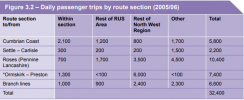Leaving aside the genuine 1 train a day routes (which are comparatively few anyway) any passenger route which forms a regular passenger service that is used by passengers in their day to day lives shouldn't close. Afterall, there are country lanes that carry one tractor and a milk wagon a week, yet we don't seem to have a problem with councils paying for these.
This is a wonderfully flowery way of saying "I don't want any route to ever close" (since any service will be used by some token number of people, even if that number of people would be too few to warrant a council subsidising a minibus service)
It's hard to take suggestions of re-openings seriously when they come from people who cannot ever accept that any existing lines warrant closure.
I'm sure that all of the basket cases Beeching closed over fifty years ago would have met your "regular passenger service that is used by passengers in their day to day lives" definition - just accept that you'll never accept any closure ever.
With the exception of catastrophic failures, councils are still expected to repair potholes, maintain signage and distribute chippings occasionally.
Many roads round here have terrible surfaces - pot holes go months without attention - surfaces are worn away to the point where markings are hard to make out - damage isn't repaired.
Whereas, railways have to be kept regularly repaired/ attended to - maybe Normanton has streets paved with gold but you wouldn't accept the railways being treated as badly as roads are in
South Yorkshire!
Frankly we've seen the national network increase in size very little over the last twenty five years, yet the costs of the network have inflated by a much greater degree over that time.
Why should passengers accept their routes being closed when these costs aren't being addressed ?
As I've mentioned before, I think the answer is to address industry wide costs.
Yes, everything has become significantly more expensive, because construction costs have gone up across the board (not just railway costs, look at the cost of any construction project - whether that's converting a lane of hard shoulder to "smart" motorway or a new runway at Heathrow) - safety costs have significantly increased on the railway as the culture has significantly improved (compared to the days when you could stick your head out of open windows, or we had people dying in train crashes most years). Staff costs have gone up above inflation (as have the associated costs - maintaining a final salary pension etc).
You like to use the "increasing costs" as a distraction from the fact that passenger numbers on a number of lines but what kind of costs are you wanting to cut (given that the costs of construction and of health & safety have gone up in similar industries over the past generation)? I'm hoping that it's something more substantial than complaining that privatisation means repainting trains every seven years or focussing on little things like the handful fo people compiling Delay Attribution.
If stations/ services/ lines were still carrying passenger levels that could be accommodated by a minibus (even after the generation of almost year-on-year growth that we had before Covid), they were never going to blossom.
I don't think I would call a route with minimal signalling such as Settle Junction - Carnforth, very expensive to maintain. Particularly compared to a country road.
There are around thirty three thousand journeys at Bentham/ Clapham/ Wennington pa (combined). So that's sixteen thousand return journeys, i.e. under fifty return journeys a day (spread between three stations, spread over several train services in each direction).
When you consider the number of passengers who use the intermediate stations and factor in the cost of the drivers/ guards (not just their direct wages but also the ancillary costs), the fuel costs of DMUs doing a couple of miles to the gallon, the fact that each carriage costs over a million pounds (so even over a forty year life span with no maintenance that's tens of thousands of pounds per carriage per year)... the trains cost quite a bit per passenger before you consider the cost of line maintenance/ signalling etc.
Admittedly, my knowledge of the central Wales line is limited, however Covid aside, I've never seen anything to suggest that its trains usually run around empty. Infact I've heard it said that It's quite useful to the community.
Everything is "useful" (if you don't want to have a look at the actual facts about passenger numbers) - "useful" is a great word that can be used to smooth over any inconvenient numbers - e.g. in four of the past five years for which stats are available on Wiki, Sugar Loaf station has had passenger numbers of fewer than one return journey per day - but you'll excuse that because "useful" can be stretched to excuse anything you want it to. Which must be useful!

